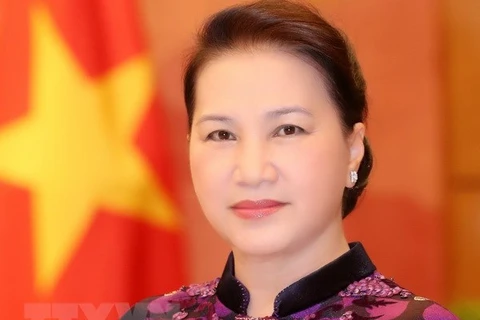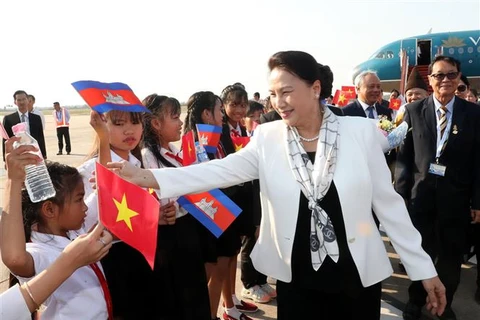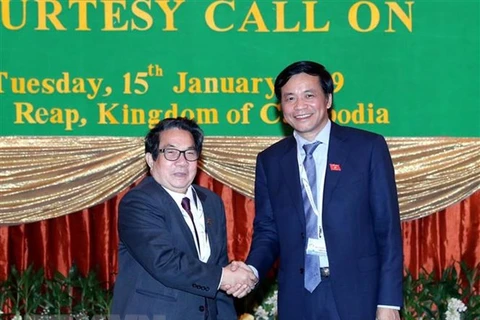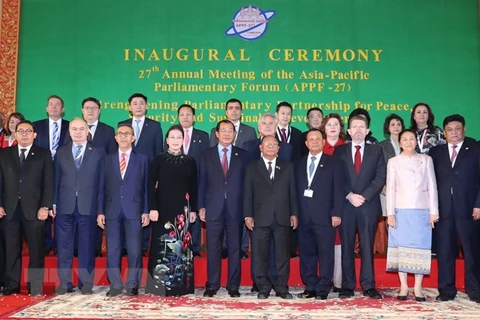Siem Reap (VNA) – The 27th annual meeting of the Asia-Pacific Parliamentary Forum (APPF-27) wrapped up in Siem Reap ancient city, Cambodia on January 16 and its chair, President of the Cambodian National Assembly Samdech Heng Samrin, declared it a success.
Chairwoman of the National Assembly of Vietnam Nguyen Thi Kim Ngan and other leaders of the APPF member parliaments attended the closing ceremony.
After listening to reports summarising the outcomes of meetings of women parliamentarians’ working group and the Committee on compiling APPF-27 documents, the meeting adopted 14 resolutions on the basis of 43 draft resolutions proposed by member countries and the Siem Reap 2019 joint declaration.
Heads of delegations signed the joint declaration and agreed to hand over APPF alternate chairmanship to the Australian parliament.
Heng Samrin presented the flag of alternate chairmanship to a representative from the Australian parliament as host of APPF-28.
Speaking at the closing ceremony, Heng Samrin affirmed that the APPF-27 has been a success with delegates proposing practical ideas and a long-term vision to build the Asia-Pacific of peace, stability, harmony and sustainable development, thus meeting aspirations of all countries.
He expressed strong support for initiatives to deal with common issues via peaceful means and avoid every military conflict, particularly strengthening parliaments’ role in mediation and maintaining peace in the region and the world.
The leader said the adopted resolutions aim to maintain peace, focus resources on women and children, fight terrorism and cyber crimes, mitigate impacts of climate change, respect human rights, improve values of cultural-tourism identity, and expand cooperation in free trade and investment in the region.
Peace and stability really provide a prerequisite for national construction and development, he said, adding that countries need to trust each other, address issues via peaceful means and seriously follow the principle of not interfering in internal affairs of sovereign countries in line with the United Nations Charter.
He added that APPF will continue playing a crucial role in encouraging member governments to realise adopted resolutions.
During the meeting of APPF’s women parliamentarians, participants discussed strengthening Asia-Pacific partnership in gender equality, empowering women and girls for peace and sustainable development, ensuring men and women’ access to education, technical training and information technology for sustainable peace and fulfillment of sustainable development goals, promoting gender equality and women empowerment in decision-making at all levels.
Discussions on political and security issues focused on trust building, fight against terrorism and trans-national crimes in the region, increased parliamentary cooperation to promote the responsible use of cyber space for social progress.
As regards economic and trade issues, they talked measures to enhance coordination in building strong institutions to step up trade and inclusive growth, promote financial access and vocational training for small- and medium-sized enterprises, increase Asia-Pacific connectivity via e-commerce.
They also looked into ways to improve parliamentary role in coping with climate change, mitigating disaster risks, and promoting cultural and tourism diversity in the region.-VNA
Chairwoman of the National Assembly of Vietnam Nguyen Thi Kim Ngan and other leaders of the APPF member parliaments attended the closing ceremony.
After listening to reports summarising the outcomes of meetings of women parliamentarians’ working group and the Committee on compiling APPF-27 documents, the meeting adopted 14 resolutions on the basis of 43 draft resolutions proposed by member countries and the Siem Reap 2019 joint declaration.
Heads of delegations signed the joint declaration and agreed to hand over APPF alternate chairmanship to the Australian parliament.
Heng Samrin presented the flag of alternate chairmanship to a representative from the Australian parliament as host of APPF-28.
Speaking at the closing ceremony, Heng Samrin affirmed that the APPF-27 has been a success with delegates proposing practical ideas and a long-term vision to build the Asia-Pacific of peace, stability, harmony and sustainable development, thus meeting aspirations of all countries.
He expressed strong support for initiatives to deal with common issues via peaceful means and avoid every military conflict, particularly strengthening parliaments’ role in mediation and maintaining peace in the region and the world.
The leader said the adopted resolutions aim to maintain peace, focus resources on women and children, fight terrorism and cyber crimes, mitigate impacts of climate change, respect human rights, improve values of cultural-tourism identity, and expand cooperation in free trade and investment in the region.
Peace and stability really provide a prerequisite for national construction and development, he said, adding that countries need to trust each other, address issues via peaceful means and seriously follow the principle of not interfering in internal affairs of sovereign countries in line with the United Nations Charter.
He added that APPF will continue playing a crucial role in encouraging member governments to realise adopted resolutions.
During the meeting of APPF’s women parliamentarians, participants discussed strengthening Asia-Pacific partnership in gender equality, empowering women and girls for peace and sustainable development, ensuring men and women’ access to education, technical training and information technology for sustainable peace and fulfillment of sustainable development goals, promoting gender equality and women empowerment in decision-making at all levels.
Discussions on political and security issues focused on trust building, fight against terrorism and trans-national crimes in the region, increased parliamentary cooperation to promote the responsible use of cyber space for social progress.
As regards economic and trade issues, they talked measures to enhance coordination in building strong institutions to step up trade and inclusive growth, promote financial access and vocational training for small- and medium-sized enterprises, increase Asia-Pacific connectivity via e-commerce.
They also looked into ways to improve parliamentary role in coping with climate change, mitigating disaster risks, and promoting cultural and tourism diversity in the region.-VNA
VNA
























